-
Car Reviews
- Car News
-
Car Comparisons
Latest comparisons
- Chasing Deals
The SP GT Turbo puts more ‘sport’ into Mazda’s midsize SUV, but there’s more polish than genuine excitement in this stylish if aging CX-5
Years ago, during Mazda’s forced-induction-dodging era and when the CX-5 midsize SUV was a much younger vehicle, the local arm would request Aussie journalists to avoid the topic of petrol turbocharging during press conferences around whatever naturally aspirated new model it was launching.
Particularly in the presence of visiting Japanese dignitaries. We did anyway, together with queries about rotaries, electrification and other once taboo powertrain topics…
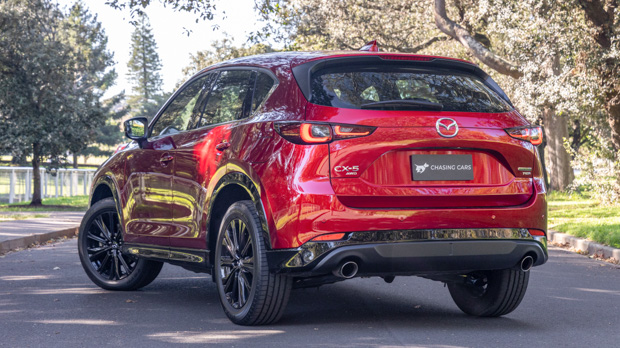
How times have changed. Incoming is the bold new 3.3-litre turbocharged inline six – who would have thunk? – and a new dawn of turbocharging has since melded into the broader lineup with swift normalisation.
Turbocharging arrived in the midsize CX-5 SUV just four years back, in 2019 in the GT and Akera, only to drop the proud ‘turbo’ boot badge a few years later to almost disguise the fact.
Thus, today’s SP GT Turbo – effectively replacing the now defunct GT at last year’s CX-5 facelift – is virtually indistinguishable in look and branding to the more affordable if lesser-endowed non-turbo SP GT, a pair that still sit as twins in the family hauler lineup. And it’s a theme not uncommon in Mazda Australia’s broader portfolio.
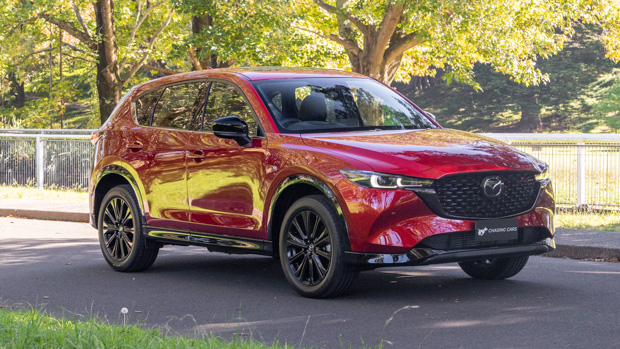
Six years young and well into its facelifted tenure, the current gen-two CX-5, well, isn’t getting any younger. But the midsize SUV’s critical history strongly suggests that it has been getting better and better with what’s been a concerted evolution.
The self-proclaimed ‘small Japanese carmaker’ has not only continued to improve, via rolling updates, what has been and remains a crucial model in a hugely important segment.
Indeed, before the new-gen Toyota RAV4 arrived in 2019, the evergreen CX-5 was the best-selling SUV in Australia for much of the preceding decade.
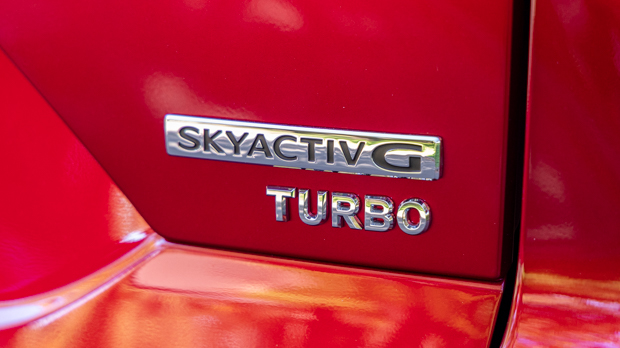
As we reported the last time the SP GT Turbo swung through the Chasing Cars’ garage, Mazda “has remained focused on making the second-generation CX-5 the best it can be.”
And that’s a quote we made just prior to the MY22 facelift anchored on improving ride comfort, adding powertrain and steering tweaks, and adding polish in areas such as NVH, styling and, in low-grade models, improved in-cabin tech.
The 2022 facelift was also quite literal: new headlights and tail lights, a revised grille, front and rear bumper and bar revisions with new-look alloy wheel designs.
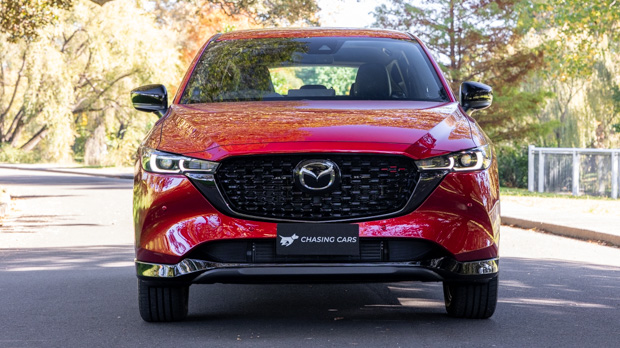
Nice? Undoubtedly. But when it comes to Mazda’s providence, the SP GT Turbo branding literally translates to promises of sportiness, grand touring finery and performance, if not literally than at least by implication.
Indeed, the ‘SP’ reboot, once bestowed to the likes of RX-7, MX-5 and other old-school turbocharged performance figureheads, came complete with the catchphrase “designed to excite”.
So, is the CX-5 SP GT Turbo exciting enough, both in outright terms and as a result of recent facelift changes aimed at making the broader midsize SUV range nicer to live with?
With the GT variant put to pasture at CX-5’s 2022 facelift, a stronger delineation was created between the SP GT and its grade-lower Touring Active range mate with which it shares much of its specifications.
Features common between Touring Active and SP GT include:
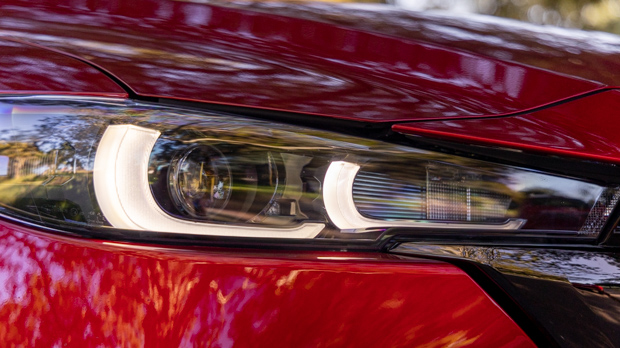
However, the SP GT features essentially the same exterior treatment as the flagship Akera.
But where the Akera favours body colour-matched trim and chrome accenting, the SP GT features gloss black for its 19-inch wheels, wheel arches, side skirts and bumper garnish and grey accented grille trim with subtle red flourishes.
The SP GT also fits a sunroof, black leather and Maxtex (faux leather) trim rather than the Touring Active’s fake suede/Maztex combination, adaptive headlight functionality, 10-way driver and six-way front passenger electric seat adjustment, and a Bose branded audio system.
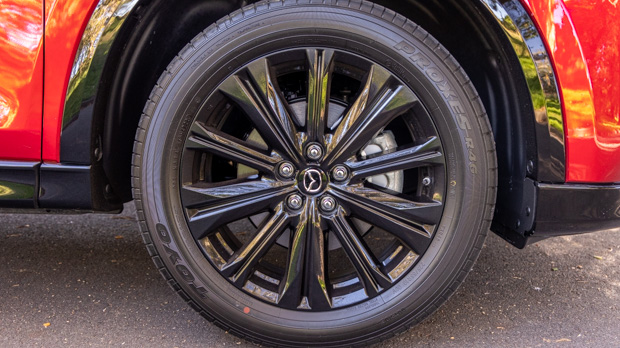
Crucially, you have to step up into SP GT grade to ‘unlock’ the 170kW/420Nm G35 turbo-petrol 2.5-litre option that lists for $51,180. However, you can get this sporty trim in naturally aspirated 140kW/252Nm G25 2.5-litre form (from $49,310).
The 140kW/450Nm D35 2.2-litre diesel offered elsewhere in the CX-5 isn’t available on the mid-tier SP GT grade.
Towing? Mazda offers an OE tow bar kit ($1565) that’s rated for 1800kg braked with 150kg downball capacity.
Is the turbo engine option worth the extra $1870 outlay? For the extra 30kW and 168Nm on tap, you betcha.
There’s nothing essential wrong nor broken with the naturally aspirated option the CX-5 made do with for eons.
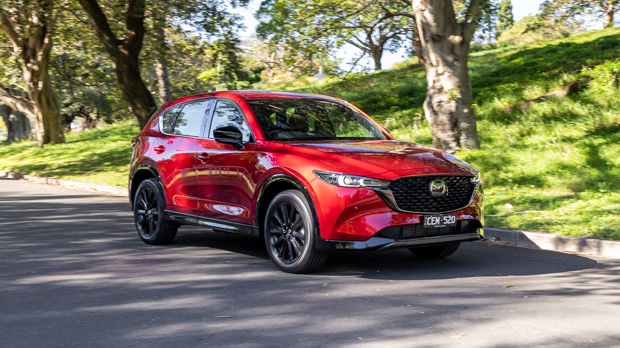
It’s just that forced induction removes all of the audible and tangible strain when it’s time to get a move on during normal driving and underpins the midsize SUV with solid thrust once you apply maximum enthusiasm with the right foot.
Quick? It sure is by the seat of the pants, returning usable on-tap muscle when you need it, particularly when merging, overtaking or exiting side streets into fast moving traffic.
However, this turbo 2.5 and six-speed auto powertrain combination is workmanlike in character. There’s nothing really much sporty about it. And with its low-to-mid-seven-second prowess for the sprint to 100km/h, the turbo CX-5 isn’t exactly a rocketship.
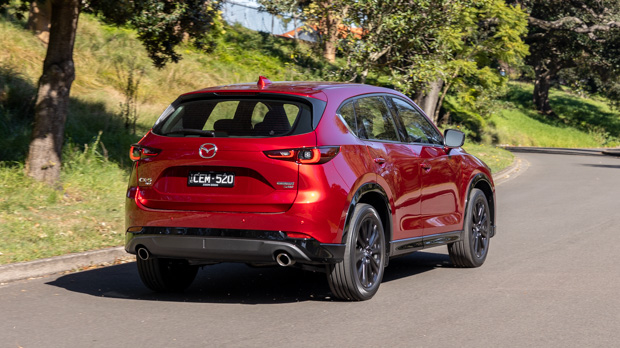
In normal drive mode, it’s demure and polite and the engine itself is quite docile in response. Driven leisurely, it almost behaves like the N/A alternative.
Dig in, and despite the surly shove the engine’s buzzy nature is rasp without much intoxicating payoff and the auto’s upshifts aren’t particularly crisp or urgent. Shifting into sport mode simply makes for louder and gruffer progress.
It’s not that hot hatch-like theatrics are necessarily expected in this middleweight family hauler, but this is likely to only be a minor letdown to some owners with enthusiastic tastes.
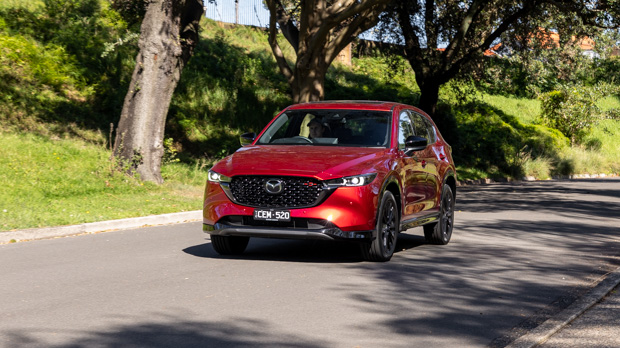
And all being said, the turbo petrol option remains the pick of the three current CX-5 engine options…if it wasn’t quite so thirsty. As we’ve reported in assessments past, the twin-turbo diesel option is as urgent and a damn sight more economical than the turbo petrol’s thirst that does spiral up into double figures at times.
Thing is, there’s no oiler option for the SP GT. You’ll have to walk up range to the Akera to unlock that choice in a high-grade CX-5.
Changes at its facelift to make CX-5 nicer, quieter and comfier pay more impressive dividends in ride and handling balance.
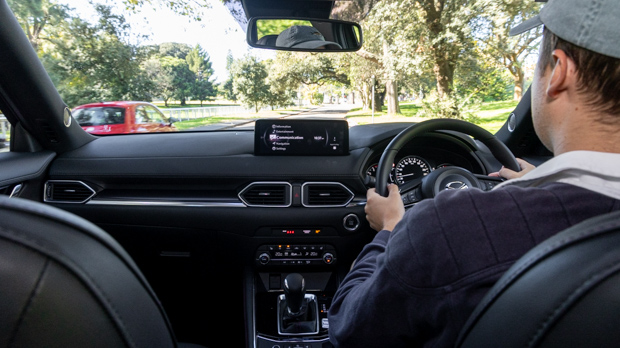
Mazda has often been accused of overly stiffening bread and butter model lines, including its midsize SUV, and tempering the former fizziness has done noticeable wonders for CX-5 around-town manner, especially for higher-grade versions such as SP GT sat on 19-inch rolling stock (lower grades sit on 17s).
The SP GT keenly blends pleasant compliance with an innate sense of connection. The ride rarely gets sharp or terse and the chassis remains fluid and cooperative, perhaps short on properly assertive body control that might present a bit more of sporting edge to proceedings.
But, on balance, it’s nicely struck and should find favour with the good many buyer’s – half of all CX-5 owners, apparently – who splurge on SP GT and Akera versions.
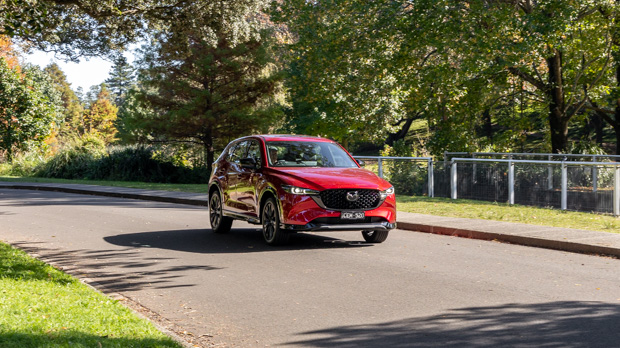
The steering, too, is nicely weighted and quite crisp. Add that to the chassis fitness and willing heartbeat and you end up with a wagon that’s sublimely satisfying to drive once you do get a move on without needing to lay on any racy fanfare.
Taken as a whole, the CX-5 SP GT is still more polite and grown-up than it is feisty and playful. Whether that is success or failure really depends on how thickly you like your veneer of sportiness spread on your SUV cake.
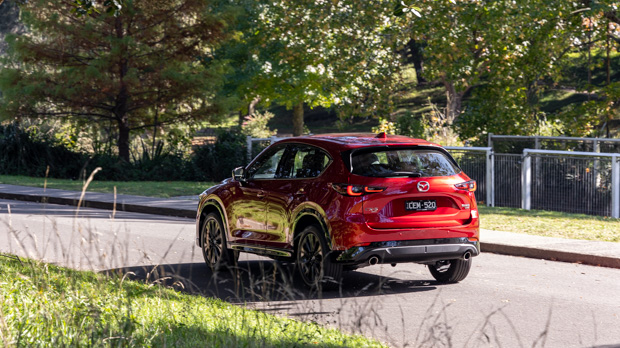
There’s a sprinkle of fun in the recipe – mostly in its willing chassis once you press on – but largely the SP GT runs close to a middle-of-the-road wagon experience as an around town proposition, if one that rarely puts a tyre wrong whilst doing so.
A decent camera system and loud and enthusiastic parking sensors mean that parking in tight spots is a breeze.
While some of Mazda’s newer and fresher model lines have leapfrogged the CX-5’s aging design, the midsize SUV’s cabin still presents smartly and punches above the average of its mainstream segment.
Key to positive impressions is the expanse of soft-touch padded vinyl across the dash, the doors and centre console, flourished in SP GT guise and combination of light grey and red double-stitching.
There are some hard plastics, but Mazda has gone to pains to (mostly) hide them out of conspicuous eyesight.
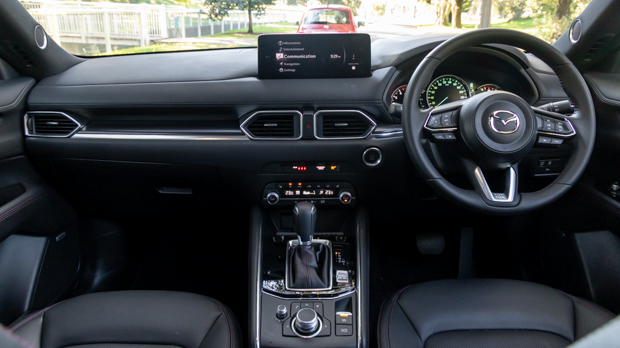
The seats are the obvious recent (facelift) change. Prior, the SP GT shared Grand Luxe faux-suede and Maztex fake leather trim with the lower-grade Touring Active.
But last year’s update bolstered the seats for improved under-thigh and lateral support, and brought perforated real leather…albeit mixed with the aforementioned Maztex stuff in “high-wear” areas.
Whatever the case, these new front seats – 10-way-power driver, six-way-power front passenger – are a nice recent upgrade.
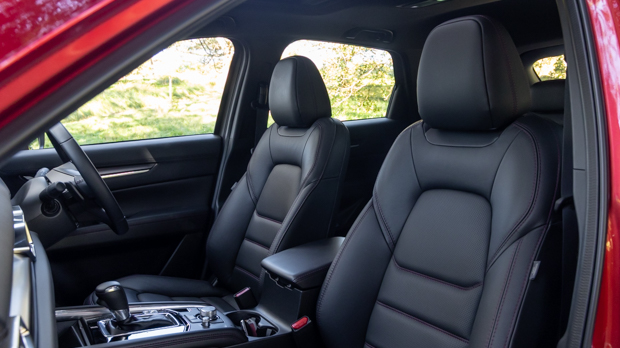
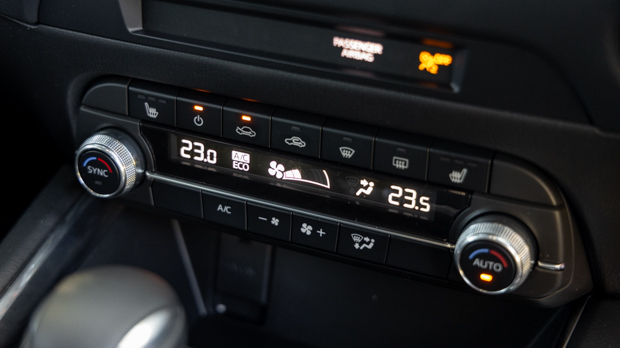
The wheel and instrumentation are, like much of the cabin, showing their age, if somewhat gracefully, and still maintain a fetching look and feel that draws many buyers.
The central roundel, a digital unit flanked by a pair of analogue display dials, changes to a red theme once you activate the sport drive mode via a tiny switch on the centre console.
Gone are the old dial controls for the HVAC, these days replaced by buttons and a monochromatic graphic displays for temperature and fan speed that look dusted off from the dark ages.
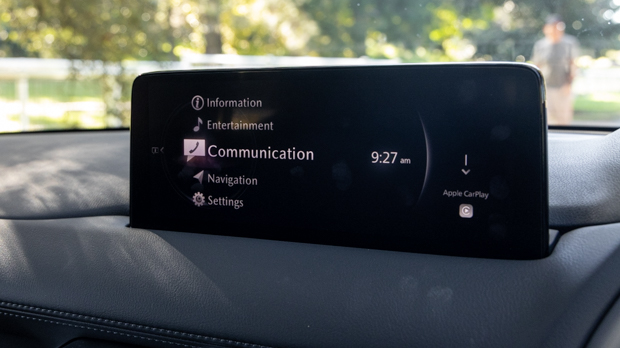
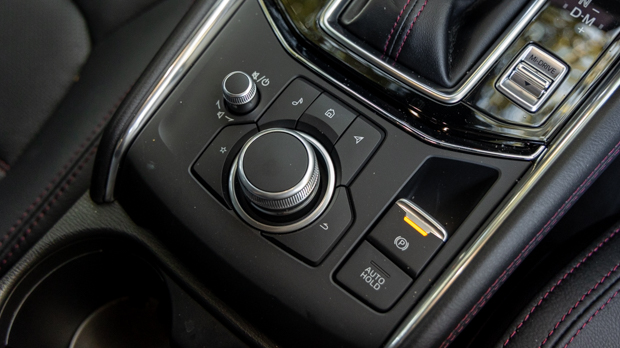
There’s now an inductive phone charge pad – and wireless Apple CarPlay as a nice combination – though the entire cabin’s sparse fitment of two USB-C outlets tucked in the centre console means keeping rear passenger devices powered is a pain.
The 10.25-inch multimedia display and MZD rotary control/shortcut control interface is tiresome and frustrating.
This is not a touchscreen system, be it moving or stationary, and some navigation, especially in CarPlay and particularly menu-hopping into and out of phone facilities or Spotify, is very cumbersome and demands a lot of driver distraction.
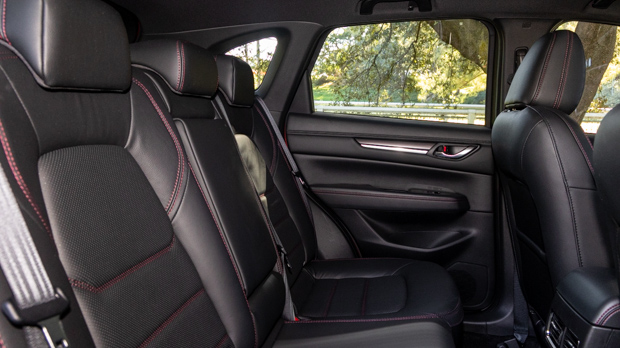
The theory, it seems, is that locking out the touchscreen improves driver safety (though without concession, apparently, to front passenger convenience) by removing distraction.
That doesn’t explain why, for example, the HVAC controls are not locked out on the move, if using similar logic…
Row two room is decent, especially for head and toe room, and the rear bench is perched at a middling height so that there’s ample adult comfort yet enough base height to afford good outward visibility for youngsters.
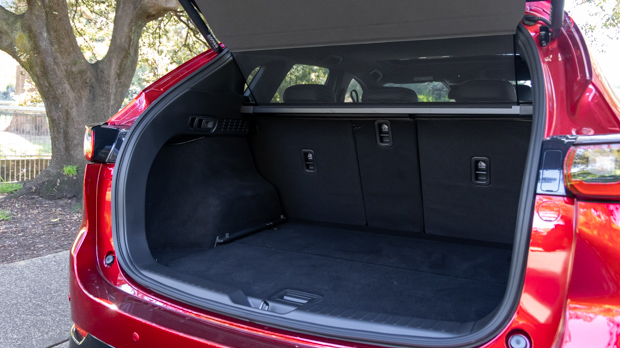
It’s packaged well enough to serve as a very popular choice for families for six years so logically it continues amply finely today.
The rear air vent inclusion is beaut while the lack of dedicated device power is a bit crap, the fold-down armrest presents a nice compliment of cupholders, a phone slot and a neat lined cubby for oddment. Door bins throughout both seating rows are well sized for bottles and other nic-nacs.
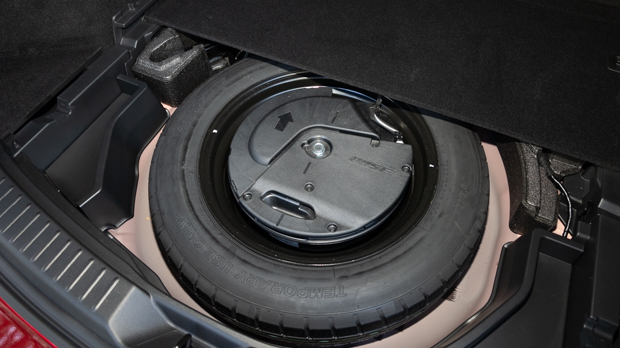
At 442 litres, the CX-5 has a good-sized boot of usable proportions that expands to 1352 litres with the 40:20:40 split-fold rear seatbacks stowed, which can be dropped using the hand levers in the cargo area sidewalls. There’s a space saver spare housed under the floor.
All up, the Mazda midsize SUV interior holds up well despite its age. And the model’s popularity over the years proves that it’s worked a treat thus far for many Aussies.
Today’s CX-5 maintains a five-star ANCAP rating date-stamped from 2017 based on an assessment conducted by Euro NCAP. The rating, which applies to all variants, is due to expire in December 2023.
Standard active safety includes all-speed AEB, forward and reverse smart city braking, lane departure warning and lane keeping systems, blind spot monitoring, emergency brake assist, forward obstruction warning, rear cross-traffic alert and traffic sign recognition.
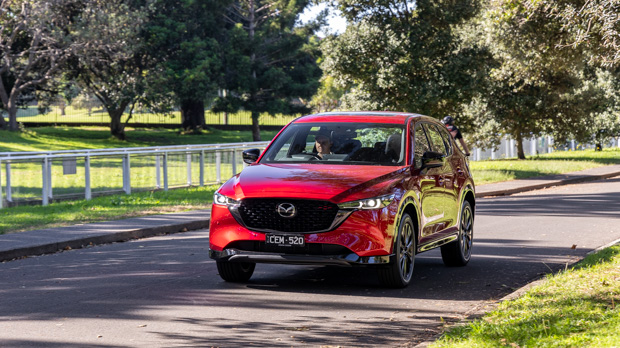
Front, front side and curtain airbags are fitted, while the cruise control system is adaptive.
Absent from the safety suite are forward AEB junction assist and front-centre airbag. Missing on SP GT if fitted on the higher-grade Akera are adaptive functionality for the LED headlights and a 360-degree camera system.
Mazda claims a combined fuel consumption figure of 8.2L/100kms and an urban figure of 10.3. On test, our review vehicle was faithful to the advertised figures, with lows of 8.0L and a long-term average nudging up into double figures.
Though not excessive for the engine performance on offer, the (G35) turbo CX-5 certainly isn’t the most frugal midsize SUV option out there. Indeed, the naturally aspirated (G25) SP GT is, with its 7.4L combined and 9.2L urban stats, around a litre thriftier everywhere on paper.
The good news, though, is that either CX-5 engine runs happily on 91RON or E10 in their 58-litre tanks.
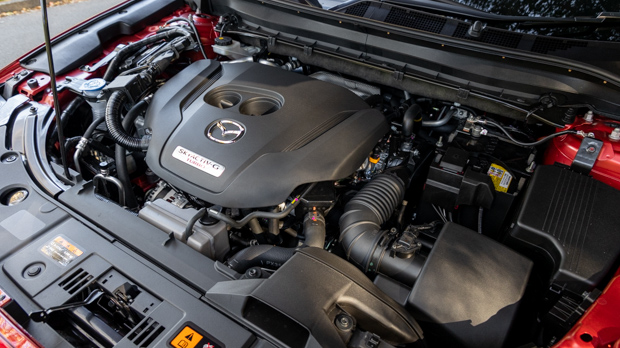
Warranty is a typical five years of unlimited-kilometre running.
Servicing intervals are every 12 months or 15,000kms. If you’re an existing CX-5 owner sitting there thinking “nope, mine’s 10,000kms,” well, Mazda finally extended maintenance intervals to a more palatable 15,000 figure – and in line with key rivals such as Toyota RAV4 – at the tail end of 2022 for MY23. Hooray!
However, servicing isn’t cheap. The MY23 demands $2505 for five visits (at 75,000km coverage) whereas the old MY22 CX-5 SP GT’s terms were $1830 for five visits (at 50,000kms). The current pricing averages out to $501 per year…or approaching twice the outlay of a Toyota RAV4’s $260 per visit.
We’ve said it before and restate it here: the choice of turbo petrol power is a great inclusion in the CX-5 range, but it didn’t yield a sport-performance SUV some had hoped for when launched and it’s not perpetuated here, despite the spicy SP GT Turbo nomenclature.
Still, the SP GT Turbo looks sporty enough and does go pretty hard when you want and need it to. And for plenty of midsize SUV buyers – petrolhead tendencies or not – what the blacked-out variant brings will be plenty.
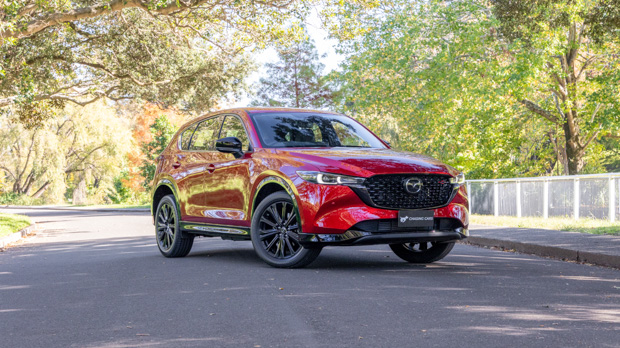
But without much core character or charisma to back up the sports pitch, we’d still be inclined to go the diesel route, ride that version’s sumptuous torque wave and save at the bowser. But, again, this demands stepping up to the Akera for a steeper outlay and different (albeit still very fetching) vibes.
Yes, today’s CX-5 is getting on. But it’s a solid and mostly foible-free package that Mazda has wisely invested into evolving mostly in tandem with changing buyer expectations.
And if there’s a model on the motoring landscape deserving of the ‘not broken, doesn’t require fixing’ mantra it’s Mazda’s still-popular midsize SUV.
It’ll soon be overshadowed by the newer, fancier, faster and more expensive CX-60 midsizer that’s key to Mazda’s upmarket push. But there are still legs in its stalwart mainstream stablemate that’s found much favour with Aussies for what’s been a fine inning to date.
Variant tested GT SP TURBO (AWD)
Key specs (as tested)
About Chasing cars
Chasing Cars reviews are 100% independent.
Because we are powered by Budget Direct Insurance, we don’t receive advertising or sales revenue from car manufacturers.
We’re truly independent – giving you Australia’s best car reviews.
The estimate provided does not take into account your personal circumstances but is intended to give a general indication of the cost of insurance, in order to obtain a complete quote, please visit www.budgetdirect.com.au. Estimate includes 15%^ online discount.
^Conditions Apply
Budget Direct Insurance arranged by Auto & General Services Pty Ltd ACN 003 617 909(AGS) AFSL 241 411, for and on behalf of the insurer, Auto & General Insurance Company Limited(ABN 42 111 586 353, AFSL 285 571).Because we don’t know your financial needs, we can’t advise you if this insurance will suit you. You should consider your needs and the Product Disclosure Statement before making a decision to buy insurance. Terms and conditions apply.
Indicative quote based on assumptions including postcode , 40 year old male with no offences, licence suspensions or claims in the last 5 years, a NCD Rating 1 and no younger drivers listed. White car, driven up to 10,000kms a year, unfinanced, with no modifications, factory options and/or non-standard accessories, private use only and garaged at night.
^Online Discounts Terms & Conditions
1. Discounts apply to the premium paid for a new Budget Direct Gold Comprehensive Car Insurance, Third Party Property Only or Third Party Property, Fire & Theft Insurance policy initiated online on or after 29 March 2017. Discounts do not apply to optional Roadside Assistance.
2. Discounts do not apply to any renewal offer of insurance.
3. Discounts only apply to the insurance portion of the premium. Discounts are applied before government charges, taxes, levies and fees, including instalment processing fees (as applicable). The full extent of discounts may therefore be impacted.
4. We reserve the right to change the offer without notice.